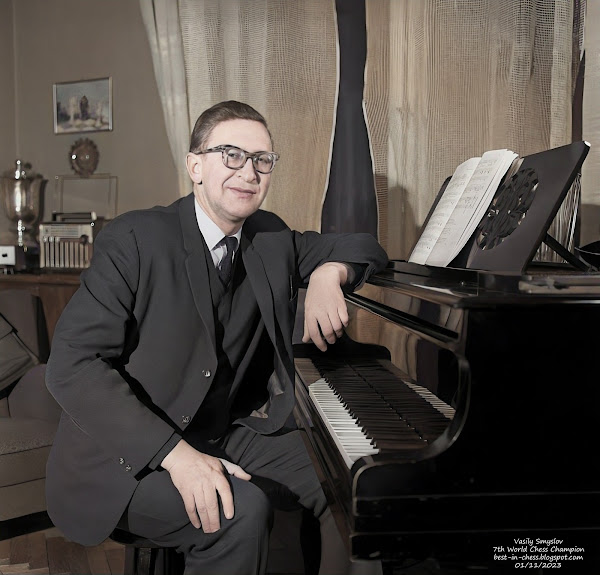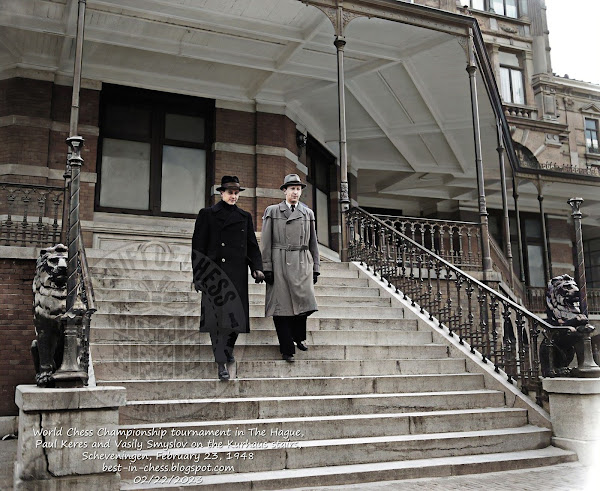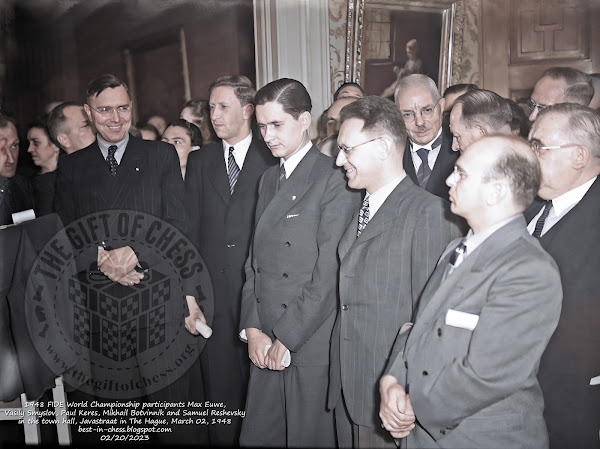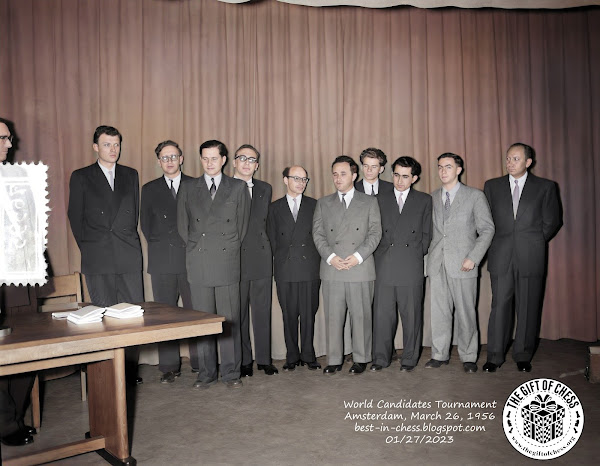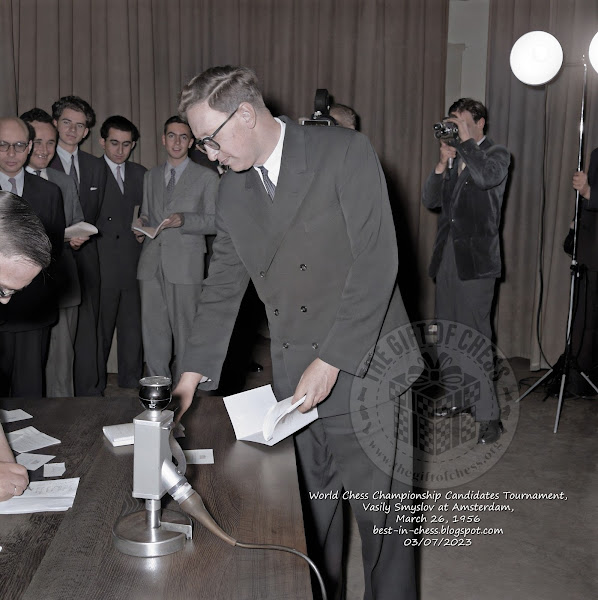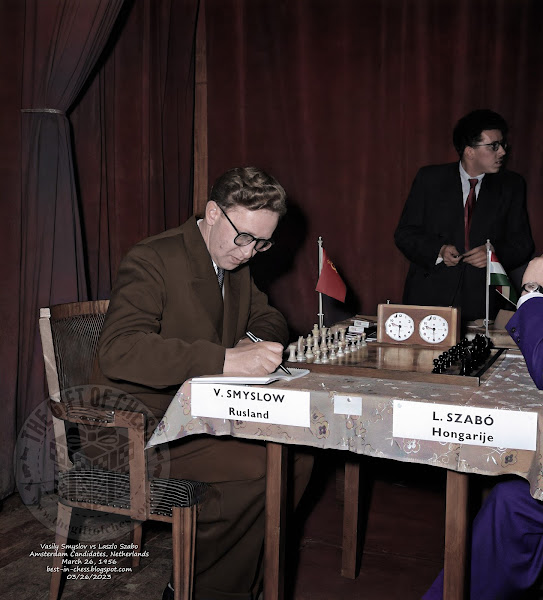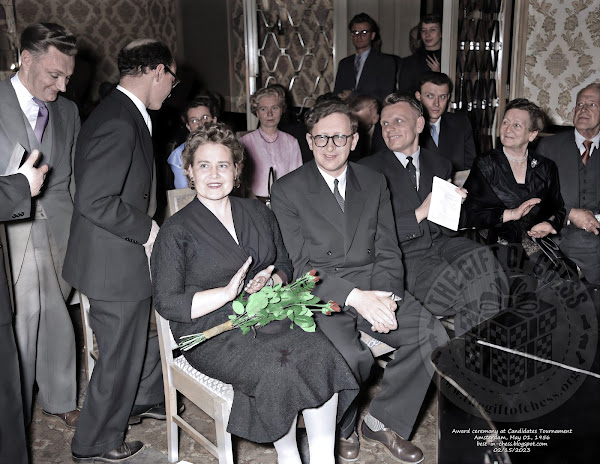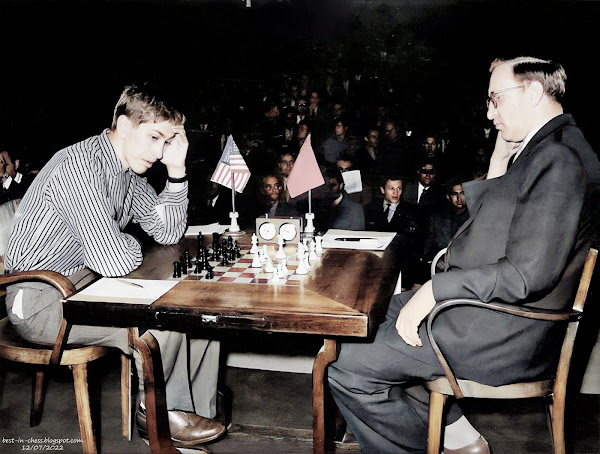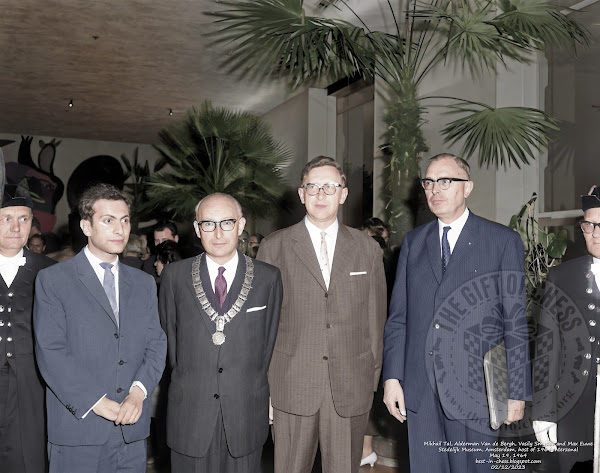Additional Games
Vasily Vasiliyevich Smyslov
March 24, 1921 - March 27, 2010
February 23 1948
March 01 1948
March 02 1948
March 26 1956
April 10 1956
May 01 1956
1957
St. Louis Globe-Democrat, St. Louis, Missouri, Thursday, April 25, 1957
Chess Title Series
Moscow, Apr. 24(AP).—Challenger Vasily Smyslov today won the twentieth game in the marathon world chess championship play against titleholder Mikhall Botvinnik. Both are Russians. Botvinnik resigned without resuming the game, after adjourning last night.
1959
May 19 1964
2010
 Vasily Smyslov 08 Apr 2010, Thu The Daily Telegraph (London, Greater London, England) Newspapers.com
Vasily Smyslov 08 Apr 2010, Thu The Daily Telegraph (London, Greater London, England) Newspapers.com
Vasily Smyslov; World chess champion who sought 'the triumph of logic' and believed in the predictions of Nostradamus
VASILY SMYSLOV, who has died aged 89, was world chess champion in 1957-58; although his tenure was brief, he enjoyed a remarkable longevity in the upper echelons of the game.
Not among the most charismatic of players (from about 1960 he was somewhat eclipsed by the more compelling personalities of Mikhail Tal and Bobby Fischer), Smyslov was renowned for his positional play, his well-conceived strategy and his skill in the endgame.
He once defined his purpose as “strict beauty and harmony, spontaneity and elegance, the faultless intuition of the artist, the absolute mastery of technique and therefore complete independence from it”, adding: “In a chess game I always sought not only victory, but also triumph of logic.”
Vasily Vasilyevich Smyslov was born in Moscow on March 24, 1921. His father, an engineer, was a gifted chess player whose apotheosis had been defeating the great Alekhine at a tournament in St. Petersburg in 1912; he taught his son the game when he was six, and it was clear from the start that the boy was unusual. The following year Vasily received from his uncle a copy of Alekhine's best games; the book was dedicated to “future world champion Vasya Smyslov”.
In the mid-1930s Vasily watched Raoul Capablanca and Emanuel Lasker competing in the Soviet capital, and in 1938 he won the USSR junior championship (his prize being a chess clock) as well as coming joint-first in the Moscow championship.
Excused from military service on account of his poor eyesight, in the Soviet “absolute championship” of 1941 Smyslov finished behind only Mikhail Botvinnik and Paul Keres, at that time considered the best players in the world. He was awarded the title of grandmaster and earned the praise of Botvinnik himself, who added: “His defects are chiefly psychological; sometimes he overestimates his possibilities during the actual game. After summing up the position he plays with great power.”
Smyslov continued to progress, winning the Moscow championship in 1942 and 1943; in 1944 he was second, behind Botvinnik, in the USSR championship. In 1949 he shared first place in the Soviet championship.
Smyslov won the right to challenge the reigning world champion Botvinnik by winning the Candidates' tournament in Zurich in 1953, defeating David Bronstein, Keres and the four-times U.S. champion Samuel Reshevsky. Other competitors included Tigran Petrosian, Miguel Najdorf and Max Euwe, a formidable line-up.
His match with Botvinnik, between March and May 1954, ended in a tie (seven wins, seven losses, 10 draws), allowing Botvinnik to retain the title. Smyslov got his second chance in Moscow in 1957, and this time he beat the champion, with six wins, 13 draws and three defeats. He was appointed to the Order of Lenin.
Under the then rules, however, Botvinnik was entitled to a rematch; and a year later the two men met over the board again. Smyslov later claimed that when he embarked on the match he was suffering from flu and that by the time it was over this had developed into pneumonia. In any event, his old adversary won easily. It was Smyslov's last world title contest, and it was left to Mikhail Tal to dethrone Botvinnik two years later.
Smyslov remained, however, a force in world chess. In 1984, at the unprecedented age of 63, he reached the final Candidates' match to determine a challenger.
In 1988, aged 67, Smyslov became the oldest player to have competed in a Soviet championship. Three years later he won the world seniors' title. He finally retired in 2001, owing to failing eyesight. He had won a record 17 Chess Olympiad medals.
He wrote several books about chess, and invented a defense to the Ruy Lopez opening, as well as developing variations in the English Opening and Grunfeld, King's Indian and Caro-Kann Defences. In 1979 he published an autobiography, In Search of Harmony.
Smyslov's other interest was music. In 1950 he had auditioned as a baritone at the Bolshoi Theatre. It was his failure to be selected that made him decide to become a professional chess player.
A member of the Russian Orthodox Church, Smyslov never joined the Communist Party and was one of the few great chess players to have a religious faith. He believed in predestination and in the predictions of Nostradamus.
Vasily Smyslov and his wife Nadezhda had latterly lived in straitened circumstances, subsisting on the rent from their Moscow apartment while they lived in the city's suburbs. He died in a Moscow hospital on March 27.











